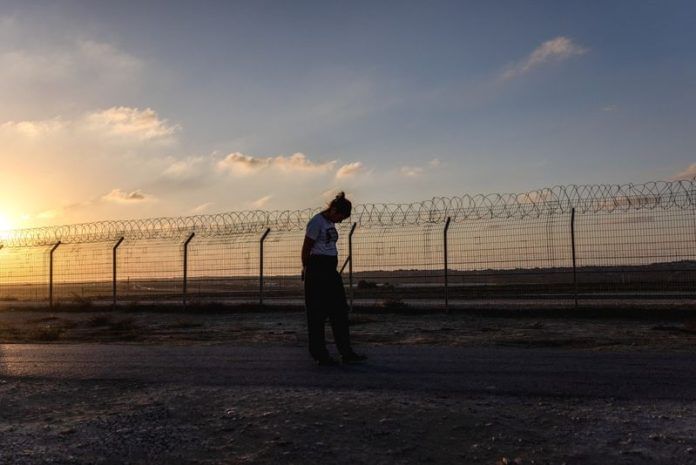By Andrew MacAskill
NAHAL OZ, Israel (Reuters) -Avishay Edri wants to move back to the kibbutz he evacuated in southern Israel after it was attacked by Palestinian gunmen two years ago, but is hesitating as fears persist that the war in nearby Gaza will resume and it will not be safe.
Edri, 41, has happy memories of raising his four children in Nahal Oz, just a few hundred metres across potato and sunflower fields from the border with the Gaza Strip.
But it is also where they spent 17 hours locked in a bomb shelter hiding from Hamas gunmen who killed 15 people in Nahal Oz and took eight back to Gaza as hostages on October 7, 2023.
Since the Palestinian militant group and Israel agreed a ceasefire last month, relative calm has returned to the area, but Edri and other residents say relief is mixed with foreboding about what the future holds.
“We are very conflicted about moving back,” Edri told Reuters by telephone from a kibbutz in northern Israel.
“It has become very important to go back for the emotional closure after the helplessness and humiliation we went through,” he said. “But this conflicts with the logic about what will happen next.”
GRIEF, DISTRUST AND UNCERTAINTY
The 2023 Hamas-led attack on southern Israeli communities led to two years of war until the ceasefire brokered by U.S. President Donald Trump.
Despite flare-ups of violence that have strained the ceasefire, Israel has after two years lifted a state of emergency in areas near the Gaza border that had allowed the military to restrict citizens’ movements.
To encourage people to go home, the government has also said it will stop paying for residents of Nahal Oz to live elsewhere.
Faced with difficult questions about whether it is safe to return and how to rebuild homes and lives in a place that now holds traumatic memories of the Hamas-led attack, about half the 400 residents are yet to return.
All that separates Nahal Oz from Gaza are the fields and rows of barbed wire. The few residents who returned before the ceasefire said rockets fired at Israel by Palestinian militants sometimes landed in Nahal Oz as war raged in Gaza.
When Reuters visited the kibbutz last week, buildings still showed damage from rocket attacks, and the regular pounding of Israeli artillery could be heard as black smoke rose above Gaza.
WAR ERODES PEACE ADVOCACY
Before the war, many kibbutz residents advocated for peace with Palestinians, and Edri would drive sick Gazans to hospitals in Israel.
He said he would find that difficult now and described himself as “naive” for thinking individual actions could prevent war.
Asked whether he thought there could be peace, he said: “Perhaps after this huge catastrophe, people on both sides will see there is nothing to gain from this kind of war”.
But that felt unlikely, he said, echoing the thoughts of many Israelis.
The number of Israelis who think there can be a peaceful coexistence with a Palestinian state fell to 21% this year, from around 50% in 2013, according to a Pew Research Center survey.
FOUNDED BY SOLDIERS, SHATTERED BY WAR
Nahal Oz, which traditionally makes money from agriculture, was founded by soldiers three years after Israel’s independence in 1948. Many residents saw living there, despite the risks, as important for Israel to stake out territory for its survival.
Then came the 2023 attack in which 1,200 people were killed in southern Israel, according to Israeli tallies, and 251 were taken hostage back to Gaza. Israel’s retaliatory offensive has killed over 68,000 Palestinians, Gaza health officials say.
The Palestinian militants who entered Nahal Oz in 2023 killed residents while livestreaming their actions on social media using phones stolen from residents.
Walking near the border fence, Yael Raz Lachyani, 49, who grew up in the kibbutz and returned with her family in August, recalled going to the beach and eating in restaurants in Gaza in the early 1980s.
She used to think about the suffering of people on the other side of the fence at times of conflict, she said, but no longer has a “place in my very broken heart to think about them”.
Asked about the likelihood of another generation of violence, she said: “I hope not, but at the moment it feels most likely”.
(Editing by Timothy Heritage)
Disclaimer: This report is auto generated from the Reuters news service. ThePrint holds no responsibility for its content.






